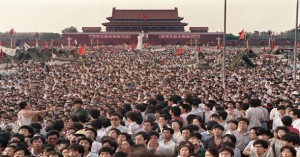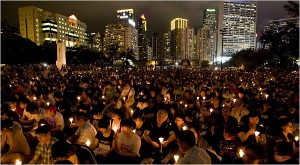Thousands of police and paramilitary troops patrolled Tiananmen Square earlier this month on the 25th anniversary of China’s brutal crackdown there on pro-democracy protesters. Although there was no trace of demonstrations or public commemorations, repressive tactics began earlier and were more extensive than in previous years.
At least 66 activists, lawyers, artists and victims’ relatives were detained by the Chinese authorities in connection with the Tiananmen anniversary, according to Amnesty International. Western journalists were ordered by the police to stay away from the square or risk “serious consequences”, according to several reporters who were summoned to meetings with security officials. One French broadcast team, picked up by the police while interviewing people about the crackdown, was interrogated for six hours and forced to make a videotaped confession. The harassments faced by journalists came with increased internet censorship, including a block of The Wall Street Journal’s Chinese site and a block of Facebook, Twitter and Google services.
In stark contrast with the silence in Beijing, more than 180,000 people – police put the estimate at 99,500 – converged in Victoria Park in Hong Kong for a candlelight vigil on Wednesday night. The names of those who had died in the protests were read out as footage of the clampdown was shown on large screens. Among the crowd were many from the Chinese mainland. Under the agreement governing Hong Kong’s handover to China in 1997, Hong Kong has far greater civil liberties than the mainland.
In the Taiwanese capital Taipei, exiled Chinese dissidents and witnesses of the crackdown addressed a crowd of about 500 people. Taiwanese President, Ma Ying-jeou, described the massacre as an “enormous historical wound” and called on Beijing to “speedily redress the wrongs to ensure that such a tragedy will never happen again”.
The United States has urged China to account for those who were killed, detained or went missing in connection with the 1989 protest. Beijing reacted angrily to the White House statement, accusing Washington of a “total disregard of fact”. Foreign ministry spokesman Hong Lei said “It blames the Chinese government for no reason, gravely interferes in China’s internal affairs and violates the basic norms guiding international relations”.
His Holiness the Dalai Lama issued a statement urging Beijing to embrace democracy as he offered his prayers to the Tiananmen dead.
One of the people detained in the run-up to the anniversary is Guo Jian, a Chinese-Australian artist who covered a diorama (model) of Tiananmen Square in 160 kilograms of ground pork. He was taken into custody the day after an extensive interview with him appeared in the Financial Times, held on a “visa-related matter” and will apparently be deported after 15 days detention.
Others include Zhang Kun, a young Chinese activist who was taken into custody earlier this year on suspicion of “picking quarrels”. Released on bail in March, he said he planned to steer clear of activities that might land him in jail again. Also swept up by China’s expansive security apparatus are prominent human rights lawyer, Pu Zhiqiang, who along with freelance writer Liu Di, social scientist Xu Youyu, pro-democracy activist Hu Shigen, and Beijing Film Academy professor Hao Jian, was detained last month after “picking quarrels and provoking troubles” at a private seminar discussing the crackdown. Although the others were released on bail two days after the anniversary, Pu’s lawyer, Zhang Sizhi, said he had no news about Pu.
Zhang, also the lawyer of detained veteran journalist Gao Yu who was detained on April 24, said that he did not know where she was being held and had not been able to visit her. However Zhang said her son, Zhao Meng, who was detained on the same charge of “leaking state secrets abroad”, has been released.
Earlier this month, 20 attorneys staged overnight protests for not being allowed to see their clients without permission from police investigators. “Under Chinese law, such a requirement is necessary only in cases such as major corruption, terrorism or subversion, and the activists in Zhengzhou were accused of public disturbance offences, which did not fall under that category”, explained prominent rights lawyer Li Fangping. The lawyers had previously signed a pledge to come to the aid of other lawyers currently being detained on public order charges.







 Print
Print Email
Email